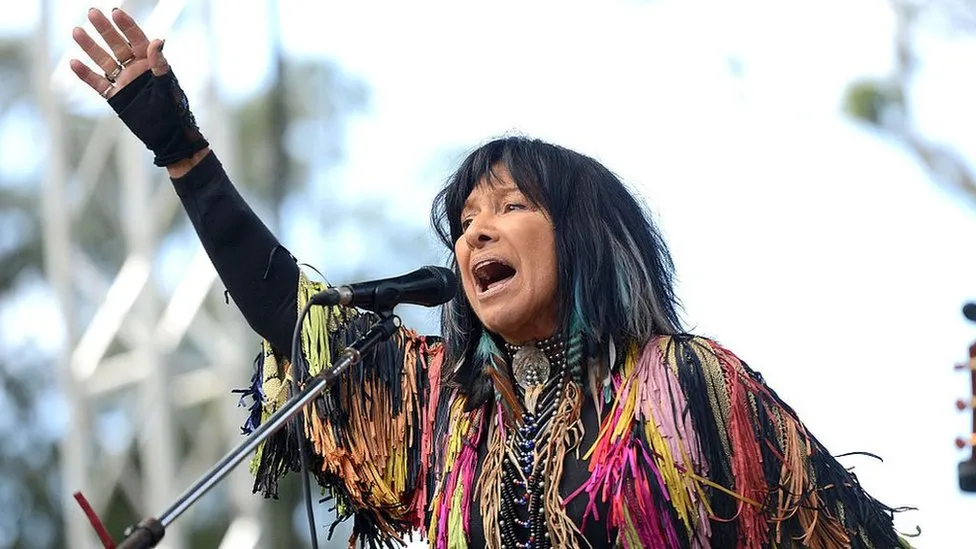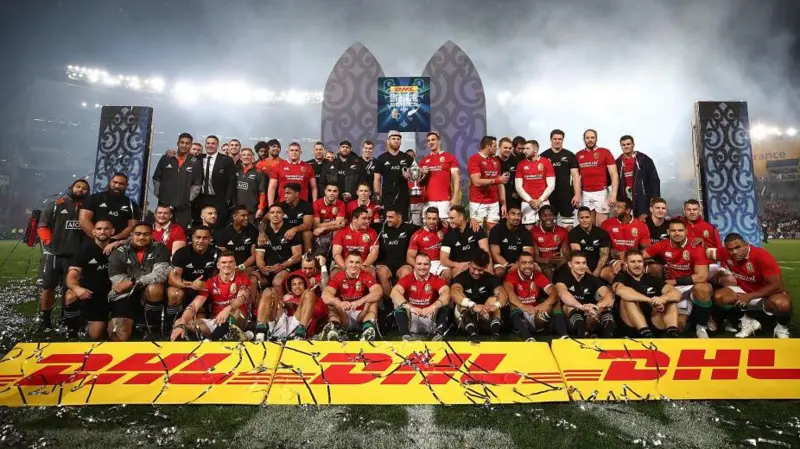Why Buffy Sainte-Marie's 'pretendian' case strikes a nerve
Prominent figures in North America have faced allegations in recent years of lying about being indigenous. But none have touched a nerve quite like the recent allegations about Buffy Sainte-Marie - an Oscar-winning folk singer long celebrated as an indigenous icon.

When playwright Drew Hayden Taylor learned that questions were swirling around Buffy Sainte-Marie's indigenous ancestry, his "jaw literally dropped".
Mr Taylor, from Curve Lake First Nations, is a long-time fan of the singer, known for songs like Until It's Time for You to Go and the anti-war anthem Universal Soldier.
"I just thought, this must be some hatchet job. There is absolutely no way that Buffy Sainte-Marie could be a 'pretendian,'" he said, using the term used to describe people who feign indigenous ancestry.
Rumours had been swirling about an investigation into the 82-year-old singer's background by the CBC's long-running documentary series, the Fifth Estate.
In late October, the Canadian broadcaster finally aired its bombshell piece.
The allegations were shocking to many of her fans, who long regarded her as an icon and trailblazer for Canada's indigenous peoples.
She is the only indigenous person to win an Academy Award, had a five-year stint on the children's show Sesame Street where she explained Cree identity to its young viewers, and her 60-year career earned her a loyal fan base across North America.
She is also credited with raising the profile of indigenous issues on the continent and speaking out against colonial oppression, which once got her blacklisted from radio stations in the US.
So the investigation raised complex questions about indigenous roots and feelings from pain to betrayal, shock and dismay among her indigenous fans in Canada.
"She's basically been invested in the indigenous community for 60 years," Mr Taylor said. "It is like a personal friend, a member of the family turning on you."
Sainte-Marie's website says she is "believed to have been born" on the Piapot First Nation reserve in Saskatchewan, and that she was adopted by a white American couple as a baby.
She said she was a survivor of Canada's Sixties Scoop, when thousands of indigenous children were forcibly removed from their families between the 1950s and 1980s and placed in foster care or adopted by a non-indigenous family as a form of assimilation.
That adoption claim is central to CBC's investigation, which reported that Sainte-Marie has a birth certificate in Stoneham, Massachusetts.
That document allegedly indicates that Sainte-Marie - whose full name is Beverley Jean Santamaria - was born to Albert and Winifred Santamaria, a couple from Italy with mostly English ancestry.
Sainte-Marie is one of the most prominent indigenous figures to have their identity questioned.
Other influential Canadian and US academics, artists and judges have faced accusations they falsely claimed to be indigenous in recent years.
Last year, the CBC raised questions about the indigenous ancestry of Mary Ellen Turpel-Lafond, a judge considered to be one of the most accomplished and decorated indigenous scholars in Canadian history,
The allegations led to her recently returning her Order of Canada, the country's highest civilian honour.
And the sisters of Sacheen Littlefeather, an actress and activist best-known for accepting a 1973 Academy Award in place of The Godfather's Marlon Brando and using the platform to advocate for indigenous rights, said after her death that she was not indigenous at all.
Sainte-Marie's story also includes another layer: in the early 1960s, she connected with a couple from Piapot First Nation in Saskatchewan, who eventually adopted her as one of their own.
The couple's granddaughter, Ntwanis Piapot, told Global News that the adoption process took several years and was done in Cree custom.
A statement by the family dismissed the CBC's investigation and affirmed that Sainte-Marie is a "beloved member" of the community.
"No one, including Canada and its governments, the Indian Act, institutions, media or any person anywhere can deny our family's inherent right to determine who is a member of our family and community," the family said.
In her own response to the allegations, Sainte-Marie said it has been "painful" to now be questioned about her identity.
"What I've always been honest about is that I don't know where I'm from or who my birth parents were," she said.
Sainte-Marie has said that she had "always struggled to answer questions about who I am", and that she had instructed her lawyer in the past to discover information about her background.
She said her "growing-up mother" had told her many things "including that I was adopted and that I was native but there was no documentation as was common for indigenous children born in the 1940s".
"I may not know where I was born, but I know who I am," she said.
Still many, like Michelle Cyca, a freelance indigenous journalist from the Muskeg Lake First Nation, believe that the information put forward by the CBC is "very convincing".
But she said it overlooked complicated aspects of indigenous identity, including Sainte-Marie's adoption and how that factors into her indigeneity, as well skepticism raised around the authenticity of her American birth certificate.
"Being indigenous is not just a biological detail," she said. "It is a political affiliation, it is a matter of citizenship."
Ms Cyca said that Sainte-Marie should still be held accountable if she has been deceptive about her identity.
"We should respect the Piapot Nation and their laws … but it doesn't cancel out everything she has said when she was building her career," she said. "It is important that we are able to unpack that nuance."
Crystal Fafard, a lawyer from Yellow Quill First Nation and a founding member of the Indigenous Women's Collective in Canada, said feigning indigenous identity is "a form of colonial violence".
"Colonialism itself is a taking - it is about taking resources, land, culture and language and children," she said. "Now, it's taking identity."
Throughout her career, Sainte-Marie has won various awards reserved for indigenous musicians, including four of Canada's indigenous lifetime achievement awards.
Ms Fafard's organisation has called for one, Sainte-Marie's 2018 Canadian Juno Award for Indigenous Album of the Year, to be rescinded.
She and others have also called on Sainte-Marie to take a DNA test to give members of the indigenous community some closure.
"It is disturbing that she would allow us indigenous people to continue to battle it out," she said.
Sainte-Marie is unlikely to be the last person to face accusations of being a "pretendian".
One report suggests that those passing off as indigenous in Canada "now number in the tens of thousands".
That is where Ms Cyca hopes people now focus their attention.
"How does it keep happening? Why does it keep happening? That is what we need to figure out."
Mr Taylor - someone who has "spent a small fortune" on Sainte-Marie's records - said he will still try to enjoy her work, albeit differently.
"I still think she is a brilliant artist," he said. "Every time I hear a song now I go, 'yeah, that sounds kind of weird' - and I enjoy it now more on an aesthetic level than on a cultural level."
-bbc







